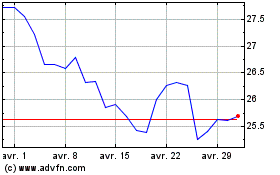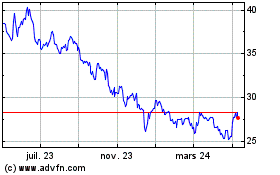Novartis, Pfizer Collaborate on Drugs Targeting Complex Liver Disease
29 Octobre 2018 - 7:44AM
Dow Jones News
By Denise Roland
Novartis AG (NOVN.EB) and Pfizer Inc. (PFE) are teaming up to
target a complex type of liver disease, underscoring the growing
willingness of drug makers to work with rivals to tackle
difficult-to-treat conditions.
The two pharmaceutical giants said Monday they will combine a
Novartis drug aimed at nonalcoholic fatty liver disease with
several Pfizer molecules that target the same condition.
The drugs in question target NASH, the progressive form of
nonalcoholic fatty liver disease. Fat buildup leads to inflammation
and scarring in the liver and can be life-threatening, requiring a
transplant.
Dozens of companies are racing to develop a treatment for NASH,
for which there is currently no approved drug. NASH is thought to
affect up to 12% of adults in the U.S., according the National
Institute of Diabetes and Digestive and Kidney Diseases. But only a
fraction of sufferers are aware of their condition because the
disease has no symptoms in the early stages. That means estimates
of the potential market size for any successful treatment vary
dramatically, from $1 billion to more than $5 billion, according to
analysts at Leerink.
Novartis and Pfizer believe combining drugs could give them an
edge over others because of the complexity of the disease. Novartis
is already testing the same NASH drug in combination with an
Allergan PLC (AGN) treatment.
"NASH is not just caused by abnormalities in the liver," said
Morris Birnbaum, chief scientific officer for internal medicine at
Pfizer. "It's a whole constellation of problems throughout the
body."
Drugs in development for NASH target one or some of the three
main aspects of the disease: fat buildup, inflammation or scarring.
Novartis's drug works on all three fronts, while Pfizer's drugs
mainly deal with fat buildup. Eric Hughes, head of development for
immunology, hepatology and dermatology at Novartis, said he
believed the Pfizer drugs would enhance the fat-fighting abilities
of the Novartis drug.
The companies plan to test various combinations of the drugs in
the laboratory to determine which ones to take forward into human
trials. All of the drugs in question are already in clinical trials
as standalone therapies, which the companies will continue.
Novartis and Pfizer haven't yet determined how they would go about
selling a combination treatment. "We'll cross that bridge when it
comes to it," said Dr. Birnbaum. The companies didn't disclose the
financial terms of the deal.
Drug makers are increasingly opting to test their medicines in
combination with those of their competitors for complicated
conditions.
Merck & Co. (MRK) is testing a cancer drug developed by
AstraZeneca PLC (AZN.LN) in combination with some of its own
oncology therapies. The two companies now share the rights to the
drug. Pfizer and Germany's Merck KGaA (MRK.XE) have shared rights
to a cancer drug that each is testing in combination with various
candidates in their own oncology pipelines.
Pfizer's Dr. Birnbaum said collaborations were becoming more
important in the pharmaceutical industry as drug development gets
more challenging.
"Every time we develop a therapy that works, the bar to develop
something better keeps going higher," he said. "It doesn't pay to
get into a race when we can get them to patients faster by working
together."
Write to Denise Roland at Denise.Roland@wsj.com
(END) Dow Jones Newswires
October 29, 2018 02:29 ET (06:29 GMT)
Copyright (c) 2018 Dow Jones & Company, Inc.
Pfizer (NYSE:PFE)
Graphique Historique de l'Action
De Mar 2024 à Avr 2024

Pfizer (NYSE:PFE)
Graphique Historique de l'Action
De Avr 2023 à Avr 2024
